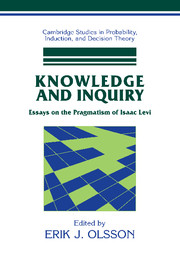Book contents
- Frontmatter
- Contents
- List of Contributors
- Preface
- Introduction: The Pragmatism of Isaac Levi
- 1 Isaac Levi and His Pragmatist Lineage
- 2 Is Pragmatist Truth Irrelevant to Inquiry?
- 3 The Knowledge Business
- 4 Infallibility and Incorrigibility
- 5 Why Inconsistency Is Not Hell: Making Room for Inconsistency in Science
- 6 Levi on Risk
- 7 Vexed Convexity
- 8 Levi's Chances
- 9 Isaac Levi's Potentially Surprising Epistemological Picture
- 10 Isaac Levi on Abduction
- 11 Potential Answers – To What Question?
- 12 Levi and the Lottery
- 13 The Value of Truth and the Value of Information: On Isaac Levi's Epistemology
- 14 Decision-Theoretic Contraction and Sequential Change
- 15 Deciding What You Know
- 16 Levi's Ideals
- 17 The Mind We do Not Change
- 18 Psychoanalysis as Technology
- 19 Levi on Money Pumps and Diachronic Dutch Books
- 20 Levi on the Reality of Dispositions
- 21 Replies
- Index
- References
7 - Vexed Convexity
Published online by Cambridge University Press: 05 March 2010
- Frontmatter
- Contents
- List of Contributors
- Preface
- Introduction: The Pragmatism of Isaac Levi
- 1 Isaac Levi and His Pragmatist Lineage
- 2 Is Pragmatist Truth Irrelevant to Inquiry?
- 3 The Knowledge Business
- 4 Infallibility and Incorrigibility
- 5 Why Inconsistency Is Not Hell: Making Room for Inconsistency in Science
- 6 Levi on Risk
- 7 Vexed Convexity
- 8 Levi's Chances
- 9 Isaac Levi's Potentially Surprising Epistemological Picture
- 10 Isaac Levi on Abduction
- 11 Potential Answers – To What Question?
- 12 Levi and the Lottery
- 13 The Value of Truth and the Value of Information: On Isaac Levi's Epistemology
- 14 Decision-Theoretic Contraction and Sequential Change
- 15 Deciding What You Know
- 16 Levi's Ideals
- 17 The Mind We do Not Change
- 18 Psychoanalysis as Technology
- 19 Levi on Money Pumps and Diachronic Dutch Books
- 20 Levi on the Reality of Dispositions
- 21 Replies
- Index
- References
Summary
THE HORSE OR THE CART?
John Maynard Keynes (Keynes 1952) proposed that probability should be legislative for rational belief. He also proposed that probabilities should form only a partial order: There were to be incomparable pairs of probabilities where the first is not larger than the second, the second not larger than the first, yet the two probabilities are not equal.
Frank Plumpton Ramsey objected (Ramsey 1931), quite correctly, that any such scheme depended on being able to relate beliefs and probabilities. He disregarded the second proposal, and so took probabilities to be numbers, so that what he took to be necessary was a way of measuring degrees of belief.
Ramsey offered a somewhat naïve operational way of measuring beliefs. He himself took it to be no more than approximate (“I have not worked out the mathematical logic of this in detail, because this would, I think, be rather like working out to seven places of decimals a result only valid to two” (ibid., p. 180). What was important about Ramsey's proposal was that it also suggested why beliefs (assuming their measurability) should satisfy the probability calculus.
Ramsey's approach became the model for later “subjectivistic” approaches. First, we think about ways in which to measure degrees of belief; second, we consider why those degrees should satisfy the probability calculus; and third, we consider how those probabilities should be updated in the light of new evidence.
- Type
- Chapter
- Information
- Knowledge and InquiryEssays on the Pragmatism of Isaac Levi, pp. 97 - 110Publisher: Cambridge University PressPrint publication year: 2006
References
- 4
- Cited by



